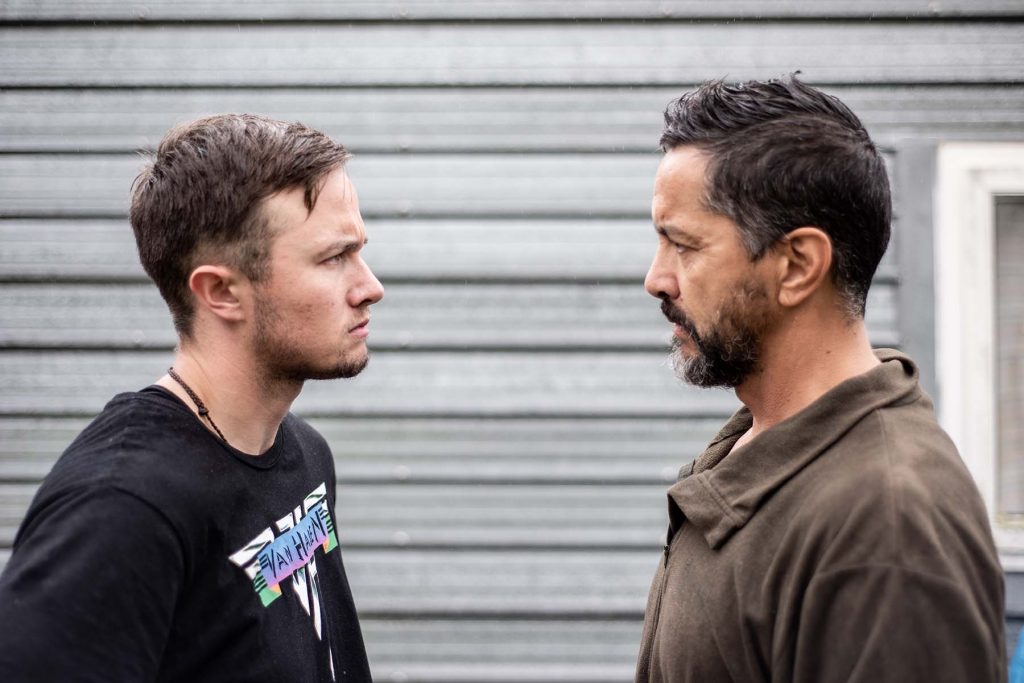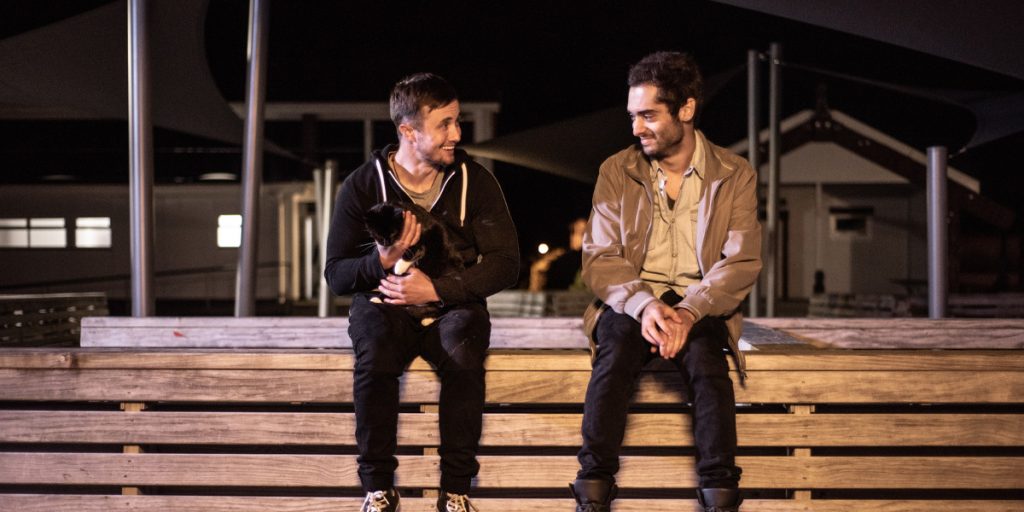One of the finest and most memorable films of the year so far, Rūrangi is a textbook guide on how to create a compelling drama.
After originally airing online in New Zealand as a 5-part web series, the episodes of Rūrangi were edited into a 96-minute feature film for international release. And whilst the runtime is succinct, this drama reverberates with an immense power, and its importance for trans representation cannot be underestimated. For a film so delightfully detailed, the simplicity of its tagline hashtag perhaps resonates the most: #byusandaboutus. Rūrangi is a film made by and starring a large number of gender diverse people and is something that needs to be seen around the world, not just in New Zealand (although its importance there is already very clear). It has a well-structured screenplay flowing with authenticity, staggeringly deep characters, memorable performances from the cast and a hugely important voice: basically, it does everything that a top drama should do. 2021 might be young, but Rūrangi stands as one of the best dramas of the year already, and may well remain that high come the end of it.
Newcomer Elz Carrad plays Caz Davis, a trans man returning to his hometown (the titular Rūrangi) after ten years. In that time, he has transitioned and become a transgender activist, hoping on his return to reconnect with his estranged father, former best friend and an ex that he has long since seen but never forgotten. It is a return full of fear and pensiveness, facing not just the people from his past but also the pain of growing up in the wrong body and not embracing his true self until he was an adult.
Rūrangi captures the crippling effect of fear so effectively, with Caz being so wracked with it that he didn’t return when his mother became ill and then passed away. Part of the resonance of Rūrangi comes from its handling of these emotions and the juxtaposition of them against the happier, more liberating feelings Caz experiences in his new life. Max Currie’s measured direction allows us to see Caz’s experiences first-hand. His anxious entry to a town hall meeting stands out as memorable, the paranoia at what people will think translated onto screen by a first-person, shaky camera viewpoint. Currie never sensationalises any scenes but always retains their emotional weight.

Carrad’s lead performance is sublime. His subtle but clear emotions amplify the joy of his transition but also the struggles that both preceded and followed it. Moments of raw, emotional outpouring (one of the earliest moments of Rūrangi sees Carrad, reflected in the wing mirror of his car, sobbing uncontrollably) bring forth this intense sorrow. Carrad just as brilliantly captures brighter moments of Caz’s life, from catching up with old friends on his return to spending time with new friends through his activism. Carrad, a trans man himself, likely drew upon feelings from his personal life, but to then translate these effectively to screen with a moving subtlety speaks volumes for his future acting career.
As much as this is Caz’s story though, there is still a great depth to the other characters in Rūrangi. They all have their own thoughts and feelings, some feeding directly into Caz and some simply creating their own, separate personality. And again, whilst the film has an overriding theme of transgenderism, it also successfully tells other stories. It highlights the importance of connection for humans, to oneself, to others, and to traditions, again feeding into the themes of transgenderism whilst working on other levels too. It would be easy to write a whole, glowing review just dedicated to the authenticity of these characters and specifically the ensemble acting in Rūrangi.
Kirk Torrance’s performance as the estranged father, Gerald, is perfect, embodying the persona of a gruff, lonely widow. Gerald does not understand Caz’s transgenderism, admitting as much late on in the film, but Rūrangi does not mark him out as a bigoted villain. Instead, we see him more as a person of another generation who eventually does move forward on his journey towards understanding, albeit slowly but hinting at a brighter, more complete acceptance in the future. Caz’s best friend, Anahera, is played by Awhina-Rose Ashby, who gives such a vibrant performance. Anahera, herself trying to reconnect with her Māori heritage by learning the language and customs, has not seen her friend Caz in ten years, but within seconds their connection is clear, the two fitting back together as if the last decade hadn’t been spent apart.
Perhaps the pick of them all, though, is Arlo Green’s Jem, Caz’s ex-boyfriend, the two dating before his transition. Jem’s surprise at Caz’s change is again written with an intelligence and quickly fades as they reconnect romantically, seen through a particularly beautiful, drunken scene in their former school grounds. Rūrangi successfully integrates a homosexual storyline into proceedings, and with an effortless ability captures Jem’s thoughts and feelings as he questions his sexuality. Green’s performance goes from the sublimely awkward to the devastatingly emotional, taking us on Jem’s journey alongside that of Caz’s.
For all the strengths of the actors in Rūrangi, it is Cole Meyers and Oliver Page’s screenplay which really enforces the characters’ depth. Meyers, a trans man and activist himself, clearly has an understanding of and some experience similar to that of Caz’s life; Rūrangi is not a film about a trans man wholly written by a cisgender man, and it is all the better for it. The love, understanding and downright emotional complexity captured in this terrific drama is testament to Meyers and Page’s writing, as well as to their dedication to having a story such as this seen by the public. Their ability to add humour into the mix too is welcome, such as the delightful clumsiness of Jem or the comedy of a shoplifting side character. They are also able to make the titular Rūrangi as much a character as the people themselves. It is a small, remote, politically divided dairy community, and is brought to life on screen quite beautifully by Currie. The director draws the sleepy but picturesque town’s aesthetic out perfectly and Rūrangi brims with authenticity, just like the people who inhabit it.
And again, despite the intricacy and depth of Rūrangi, it can be summed up so beautifully by a simple line spoken close to the ending by Anahera. As she talks to Jem about her own sexuality as a lesbian (she has been out for a while), she asks him what the town think of it. Jem explains that, whilst some of the townspeople accept it, a lot of them still wrongly think she might be attracted to men too. Anahera, understandably frustrated, concludes that people are stupid and succinctly ends the conversation with the words: “You do you”. These are three words of such importance that can give hope to so many. They show that Rūrangi is one of those films of such high importance, it straddles the cinematic medium and society as a whole. You do you: three words that everyone needs to hear. Rūrangi: one film that everyone needs to see.
Rūrangi premiered online at BFI Flare in March 2021 and is now available to watch on digital and on demand.

